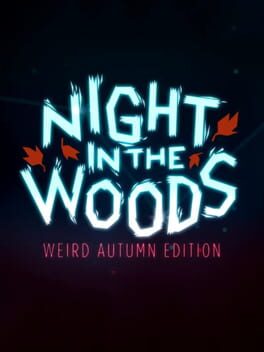Night in the Woods is a lot to unpack. The story of its creation, of the people who got together to develop it, is a fairly tragic line of inquiry nowadays; a story of passion for creation, sure, but also of abuse, and death, and sickness.
A direct result of the tragedy of its makers is that we will, more than likely, never get a game like it again - Revenant Hill having been cancelled due to Scott Benson's health issues. And while that's a shame, it also makes the fact Night in the Woods happened all the more special. I wish The Glory Society's members only the best.
This game speaks in an intensely true way to the struggles and the soul of the younger generations' early adulthood in this current-day world. In 2017 as beyond, when Weird Autumn Edition finally finished parts of the game that lay incomplete before, the game got at a potent anxiety and its core in my life.
Not only did Mae strongly mirror my struggles with mental health, she also reminded me of how hard I'd fought to fit into society, not succeeding; how, in that situation, some turn to befriend, uphold and be upheld by other outcasts, while others cling to family, and others again slip down a slippery slope and descend into an ideological muck. Seeing people as things; seeing people as shapes. It's a headspace Mae is saved from by her friends, and circumstance - as I was, when it almost happened.
I can't hide what I know is true: Night in the Woods, alongside my studies of history and 1900s European literature, made me an anti-capitalist, and antifascist. I wouldn't be who I am without it; I wouldn't make what I make without it. Its villains are a harrowing portrait of self-interested intentions burning squarely in a hell of their own paving; of the brainrot that is killing the United States and many other places.
It's not a perfect game in its pacing or some of its thematic glue, but ultimately, playing this is very worth it. It's a game that understands, gets it in a way very few other things have since.
A direct result of the tragedy of its makers is that we will, more than likely, never get a game like it again - Revenant Hill having been cancelled due to Scott Benson's health issues. And while that's a shame, it also makes the fact Night in the Woods happened all the more special. I wish The Glory Society's members only the best.
This game speaks in an intensely true way to the struggles and the soul of the younger generations' early adulthood in this current-day world. In 2017 as beyond, when Weird Autumn Edition finally finished parts of the game that lay incomplete before, the game got at a potent anxiety and its core in my life.
Not only did Mae strongly mirror my struggles with mental health, she also reminded me of how hard I'd fought to fit into society, not succeeding; how, in that situation, some turn to befriend, uphold and be upheld by other outcasts, while others cling to family, and others again slip down a slippery slope and descend into an ideological muck. Seeing people as things; seeing people as shapes. It's a headspace Mae is saved from by her friends, and circumstance - as I was, when it almost happened.
I can't hide what I know is true: Night in the Woods, alongside my studies of history and 1900s European literature, made me an anti-capitalist, and antifascist. I wouldn't be who I am without it; I wouldn't make what I make without it. Its villains are a harrowing portrait of self-interested intentions burning squarely in a hell of their own paving; of the brainrot that is killing the United States and many other places.
It's not a perfect game in its pacing or some of its thematic glue, but ultimately, playing this is very worth it. It's a game that understands, gets it in a way very few other things have since.
